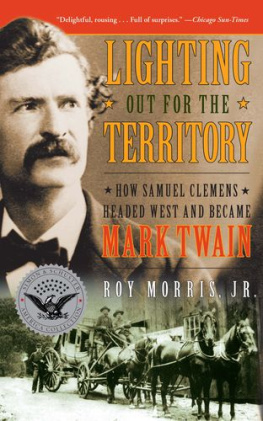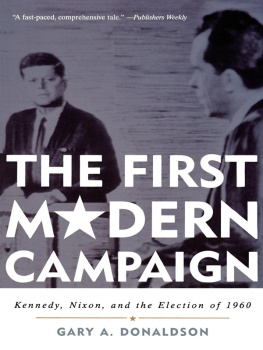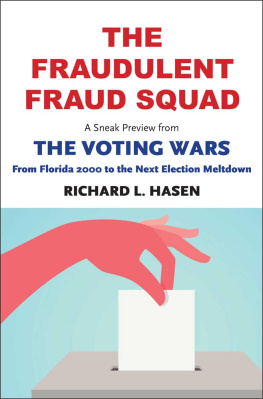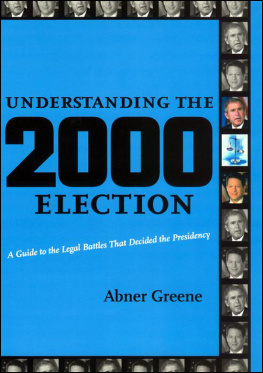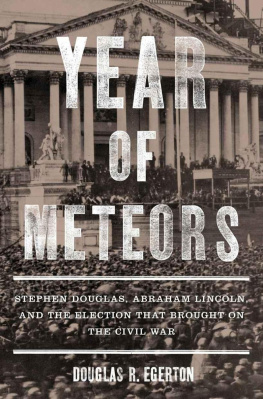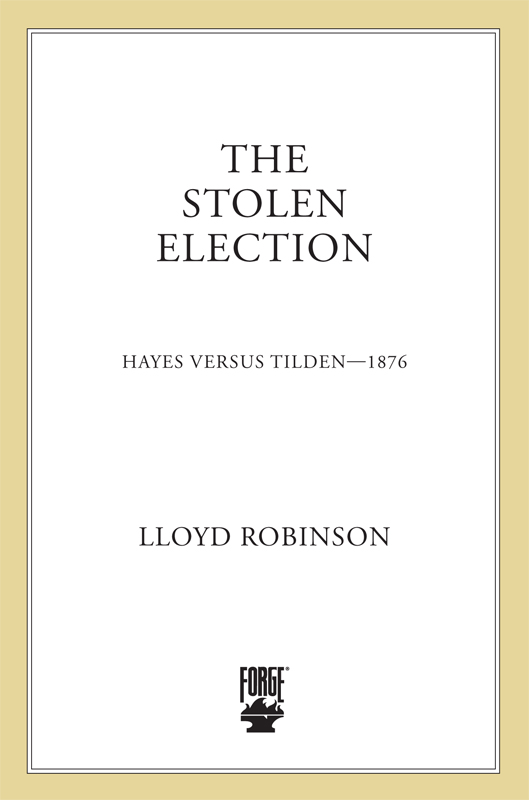
The author and publisher have provided this e-book to you without Digital Rights Management software (DRM) applied so that you can enjoy reading it on your personal devices. This e-book is for your personal use only. You may not print or post this e-book, or make this e-book publicly available in any way. You may not copy, reproduce, or upload this e-book, other than to read it on one of your personal devices.
Copyright infringement is against the law. If you believe the copy of this e-book you are reading infringes on the authors copyright, please notify the publisher at: us.macmillanusa.com/piracy.
Contents
Foreword to the 2001 Edition
I wrote this book in the summer of 1967, at a time of great domestic trouble in the United States. I wrote it partly because I wanted to retell a fascinating episode in American history, and partly because I suspected that, in the turbulent state of our nation back then, we might find ourselves living through some sort of replay of the Hayes-Tilden election someday. I stated this explicitly in the prophetic final paragraph of the book, and I will be giving away no surprises if I quote from that paragraph now:
Probably we will be spared the turmoil and the agony of a disputed electoral count again, but the possibility remains alive. And if it comes to pass, the entire world will watch in fear and wonder as the giant of democracy struggles once more to choose its leader.
The national troubles of 1967 are matters for the historians now. The war that we were fighting in Southeast Asia, which so bitterly divided the country between those who thought we were defending a sacred trust and those who felt we were betraying the moral principles by which the United States has always claimed to live, eventually did come to an end. It left a legacy of political, social, and economic consequences, as wars always do, but, for better or for worse, our unhappy adventure in Vietnam has by this time ceased to be an active force in modern American life. And the other great issue of that time, that of providing full civil rights for the people who were then called Negroes, has also receded into the background of the national discourse. We are still a long way from true racial equality, of course. But we are no longer having a national debate over whether it was permissible to disqualify our black citizens from obtaining adequate housing, attending decent schools, holding mid- and upper-level jobs, or, for that matter, eating wherever they pleased and sitting wherever they pleased in public transportation, simply because they were black. It may now be hard to believe it, but all of those issues required direct legislative action in the 1960s before they were accepted as the law of the land in every one of the fifty states.
The divisions over Vietnam and civil rights in the 1960s raised the prospect of divided electionsthe presence of third- and even fourth-party candidates who, unlike Ralph Nader and Patrick Buchanan in the 2000 election, might actually draw enough electoral votes away from the candidates of the major parties to throw an election into the House of Representatives for decision. As it turned out, no such thing happened. But Governor George C. Wallace of Alabama, the most outspoken Southern advocate of racial segregation, not only threatened such a third-party candidacy in 1967, but followed through on his threat and received 46 electoral votes in the Nixon-Humphrey election the following year. In a closer election, with an independent antiVietnam War candidate also on the ballots and drawing electoral votes, that might have been enough to require Congress to decide the outcome.
The political turmoil of the mid-1960s called to my mind the turmoil of the mid-1870s, whenwith race the issue then, as it would be laterthe complexities and structural inadequacies of our electoral system were laid bare by an excruciatingly close election that ultimately was decided, not by the American voters, but by a fifteen-member Electoral Commission consisting of five Senators, five Representatives, and five Justices of the Supreme Court. From the distance of a century and a quarter, it is quite clear that the victory in the election of 1876 was stolen from the winning candidate, the Democrat Samuel J. Tilden, by fraudulent manipulations in four Southern states that were confirmed by a strictly partisan vote of this Electoral Commission.
After the troubled election of 1876, certain legislative reforms were put into place that supposedly would prevent a repetition of the Hayes-Tilden charade. But as we saw to our great dismay in November and December of 2000, our electoral system is still ridden with chasms of contradiction and the potential for chaos.
I do not happen to believe that the Bush-Gore election of 2000 was a stolen one in the Hayes-Tilden sense. It was certainly a hotly disputed one, but the dispute centered on methods of counting votes in one state, andas the final 54 Supreme Court decision showedthe outcome depended, finally, on the interpretation of existing state law, rather than (as in 1876) the illegitimate overturning of properly conducted vote-counts by corrupt boards of local officials.
But that is not the point. What we all came to see, during the chaotic post-election weeks of 2000, is that chaos lurks behind the surface of the rules in any closely contested presidential election. Suppose Florida had not managed to certify any legitimate slate of electors in time for the meeting of the Electoral College: how many electoral votes, then, would it take to decide a winner? Would it be a majority among the remaining qualified electorsin which case Al Gore would have been electedor a majority of the entire Electoral College, in which case, with neither candidate getting the requisite 270 votes, the House of Representatives would have had to decide? The Constitution does not clearly say. Other ambiguities also surfaced concerning the relative electoral roles of the House of Representatives and the Senate (whose presiding officer, permitted to cast a tie-breaking vote, was none other than Al Gore), and the power of the Florida state legislature, and of the Governor of Florida. Wherever one looked, one saw irreconcilable contradictions and mysteries in the deepest layers of our electoral law.
In the end, the United States Supreme Court cut through the chaos by terminating the tortured Florida vote-counting process before it became necessary to explore the deeper mysteries of our election law. The Court feared, I think rightly, that if the election were permitted to move on into Congress for a decision, the country might stumble on and on into confusion and division until, ultimately, the whole affair would return once again to the Supreme Court, but only after intolerable damage had been done. The Courts decision was a damage-control intervention.
In the aftermath of Bush-Gore has come a cry for reform of the system, just as there was in the aftermath of Hayes-Tilden. No doubt some changes will be made, though not, I think, anything as major as the abolition of the Electoral College itself and direct election of the President by popular vote. The basic system will probably survive. But certainly the lesson of Bush-Gore is that if an election contest is ever allowed to proceed into the farthest reaches of all the contingencies, we will quickly reach a point where various elements of the law butt up against each other in hopelessly contradictory fashion; and those built-in contradictions need to be fixed before the next election. I hope that they are.


